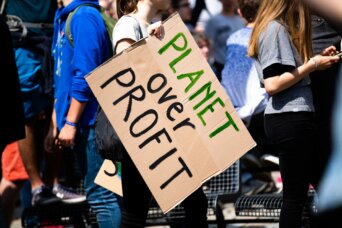- About
- Topics
- Picks
- Audio
- Story
- In-Depth
- Opinion
- News
- Donate
- Signup for our newsletterOur Editors' Best Picks.Send
Read, Debate: Engage.
| topic: | Climate action |
|---|---|
| located: | Germany, France, Belgium |
| editor: | Abby Klinkenberg |
This year’s Earth Day slogan, “Invest in our Planet,” strikes an oddly capitalistic chord at a moment when capitalism itself is increasingly recognised as the root cause of the climate crisis.
Similar to the ongoing debate regarding whether technology has the potential to “solve” climate change, the question arises of whether capitalism can be leveraged for the greater good. And as the European Union unveils its latest plan to regulate green finance mechanisms in the bloc, this line of questioning takes on a new relevance.
By mobilising capitalist investment for environmental ends, are we simply trying to have our climate-conscious cake and eat it too? À la bell hooks, can we address climate change via the same mechanisms that caused it in the first place?
As green investment opportunities proliferate at a staggering rate - over 100 fold over the past decade - environmentally friendly financing might be the future; but it comes at the cost of decolonial and anti-capitalist grassroots alternatives.
Instead of the myriad angles relating to equity or justice that Earth Day could have taken in its 2022 media campaign, it chose to focus on investment and the pursuit of green business, which it posits as “not only the ethical option but also the lucrative one.”
Deeply mired in the capitalist value hierarchy, Earth Day frames the climate crisis in neoliberal terms: “unless businesses act now, climate change will ever more deeply damage economies, increase scarcity, drain profits and job prospects, and impact us all.”
A far cry from Earth Day’s radical roots, capitalism is presented as the only mode of being, either today or in the future; Margaret Thatcher’s “there is no alternative” doctrine comes to mind. Earth Day’s capitalist assumptions are bold: “when it comes to climate change, money talks.”
Money may talk, but it probably shouldn’t: here, Mark Schuller and Julie K. Maldonado’s definition of ‘disaster capitalism’ as "national and transnational governmental institutions’ instrumental use of catastrophe […] to promote and empower a range of private, neoliberal capitalist interests" becomes particularly salient.
In many ways, green financing simply continues to feed the machine. As Joshua Long clarifies in his article on crisis capitalism and climate finance, "addressing the climate crisis introduces an extremely profitable frontier for financialisation, investment, and influence. That frontier thrives on capitalism’s ability to exploit the crises that it creates while also extracting value from vulnerable ecosystems, institutions, and people." Cast under this light, "Invest in our Planet" can and should be interpreted more cynically as a dictum that, at least in part, shores up extant global capitalist power structures.
Uncritically taking this year’s Earth Day slogan to heart, the European Council published its “Regulation of the European Parliament and of the Council on European Green Bonds” on 8 April, outlining its plans to facilitate the flow of private capital towards a greener future.
The document "lays down uniform requirements for issuers of bonds that wish to use the designation ‘European Green Bond’… for their environmentally sustainable bonds made available to investors in the Union, and establishes a registration system and supervisory framework for external reviewers of European green bonds." Following Earth Day’s rhetoric and aiming to reinforce the notion that "there is no longer a choice between going green and growing long-term profits," a final version of the regulation will soon be negotiated with the European Parliament.
But the EU is not just working to bolster green finance initiatives within its borders, it is also working to "support Africa for a strong, inclusive, green and digital recovery and transformation" with its Global Gateway Africa – Europe Investment Package, announced on 28 February. As part of this initiative, "the EU will seek to support partner countries in developing and scaling up their green bond markets, thereby helping them to attract greater financing from the international capital markets and institutional investors for their sustainable investment."
When green financing initiatives like the EU’s Global Gateway strive to integrate "partner countries" in the Global South into the global market, as Long emphasises, it can and often does reinforce neocolonial interventionist structures by privileging "development initiatives that are largely top-down, technocratic, and costly […] consistently overlook[ing] histories of colonial exploitation and structural injustice, thereby exacerbating, rather than alleviating, disparities and vulnerabilities." In reality, "Investing in our Planet" often only further entrenches existing circuits of capital and power that benefit the Global North.
The mobilisation of extreme sums of money to fund climate projects may sound bulletproof, but the private sector cannot be the only hope - at either the EU or the global level.
Earth Day cannot be reduced to a conversation about green finance, investment opportunities or securing "lucrative" profits for businesses that do the bare minimum by taking climate change seriously.
For a truly equitable future, feel-good investment is simply not enough. Green bonds are not enough. Moving forward, Earth Day must be restored to its radical roots, bringing millions of people together around the globe to voice a common call for systemic, anti-capitalist change.
Image by Markus Spiske.

